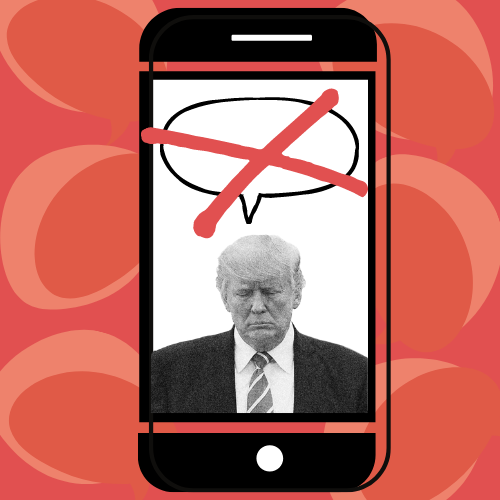Trump Banned on Social Media
January 8, 2021
On January 6, just as the Senate was convening to certify the electoral votes, President Trump held a rally at which he told gathered supporter that “you’ll never take back our country with weakness. You have to show strength, and you have to be strong.” His attorney, Rudy Giuliani told the incensed mob, “we will have a trial by combat.” Shortly thereafter, Trump supporters stormed the U.S. Capitol in an attempt to stop the electoral vote count. As the capitol was breached, protestors destroyed property, vandalized offices, and imperiled the safety of many (including one capitol police officer who later died from his injuries). The president remained silent.
President Donald Trump was called upon to tell his supporters to go home. Instead, in a video posted to Trump’s Twitter account, he proceeded to falsely claim that he won the presidential election in a landslide and told his supporters “we love you…you are very special.” This was viewed, b some, of the president’s support of the protestors’ violent outburst.
President Trump claimed in the Twitter video, “I know your pain. I know you’re hurt. We had an election that was stolen from us. It was a landslide election and everyone knows it, especially the other side”.
That same night Twitter removed that video along with other tweets that claimed election fraud. Twitter suspended his account for 12 hours and told Trump if didn’t take down the posts his account would be banned. Trump took down the posts and received his account back the next morning. A day later on Jan. 8, Twitter permanently banned Trump’s Twitter account for “incitement of violence”.
On the same day, Reddit banned Trump for “promoting hate and encouraging violence”. They also took down an independent forum called The.Donald.win. Discord has banned a server in relation to The.Donald.win. Since then Snapchat and Twitch have also banned Trump so he cannot live stream. Facebook and Instagram have banned him till he is out of the presidential office.
Pinterest and Tiktok have been limiting certain hashtags, such as “#StoptheSteal”. Tiktok is also removing any videos of Trump’s speech to his supporters. Youtube is reevaluating its policies regarding election misinformation. As of Jan. 13, Trump’s official account has been banned for at least a week. Shopify has taken down Trump Organization and Trump campaign merchandise stores and Stripe will not process payments related to Trump’s campaign.
Parler, a conservative social media platform that brands itself as a conservative free-speech alternative to sites like Twitter, was used to coordinate the attacks on the Capital. Because of its violent use, it has been removed from Google Play Store, Apple App Store, Amazon AWS, Okta, and Twilio.
Supporters of the president complain that this virtual shutdown of their ability to express their thoughts impedes upon their constitutional rights. Trump himself called it, “an unprecedented assault on free speech.” To be clear, though, the First Amendment states, “Congress shall make no law … abridging the freedom of speech.” In other words, one has the right to say anything one wants, as long as the government doesn’t stop one from saying it. In this case, Twitter, Facebook and those other platforms are companies which have a right to create and enforce their own policies among their clients. It’s not the government preventing Trump and his followers, it’s private business. If you break their rules, they have the right to kick you out. This is no different than businesses that post “No shirt, no shoes, no service” on their front door.
Companies like Twitter and Facebook were arguing that those using their platforms were doing so to plan illegal and violent activities, which would make them accomplices to any outcome that happened. They, therefore, had the right to protect themselves from being forced to participate in illegal activities.




